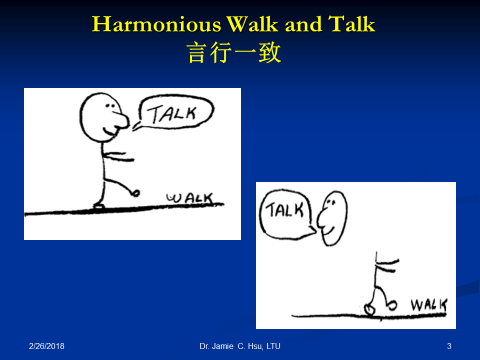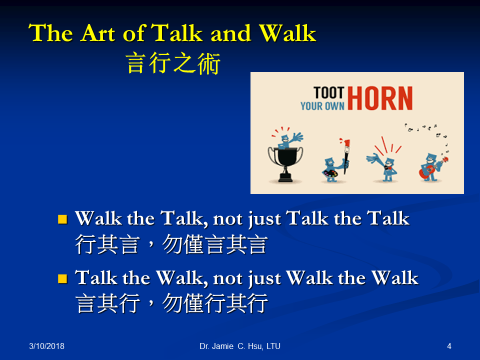
The Art of Walk and Talk
– Musings of Dr. Jamie C. Hsu, 3.12.2018
There is an American saying, “Walk the talk, don’t just talk the talk.” For many of my students and mentees, I would add the advice of “Talk the walk, don’t just walk the walk.” Here is why:
In our daily work and dealings, we often encounter the “talkers” among our bosses or colleagues who are very good at expressing opinions, giving promises, or issuing orders. But they don’t roll up their sleeves to do the work, or worse yet, they don’t live up to the high values and moral standards as declared. To counter that, we are taught to Walk the Talk and not be a hypocrite who acts in contradiction to his or her stated beliefs and objectives.
On the other hand, there are the silent “doers” who just bury their heads and do the assigned tasks, pursue their own interests, or explore innovative ideas. They don’t see the need to inform and involve others in their work. As such, some of these “doer” employees often complain about the boss or colleague’s ignorance of their talents, contributions, and accomplishments. Yet they don’t even bother to give any regular progress reports and expect others to know everything about their great work. As a consequence, these stubborn silent “doers” often end up as loners or non-team players. They forget the importance of “Talk the Walk.”
Although “tooting your own horn” is important, we shouldn’t overdo it, especially in the era of social media. Many young people post their whole lives on social media, bragging about their every little accomplishment and every new experience. You do want to talk the walk, but not with trivial stuff so as to bore other people.
A right balance of “walk the talk” and “talk the walk” is important. We need to use both to build a solid reputation as a doer, communicator, team player, and leader.
This is the art of “Harmonious Talk and Act.”


言行並重之術
-作者 許俊宸博士
-中譯 薛乃綺
有句美國諺語“Walk the talk, don’t just talk the talk” (意思是“行其言,勿僅言其言”)。對我的許多學生們或後輩們來說,我建議加上” Talk the walk, don’t just walk the walk” (意思是“言其行,勿僅行其行)。我們來看看这是為什麼。
在我們日常生活中,經常遇到”出嘴巴”的老闆或同事,他們擅長表達意見、承諾,或發出命令。但他們並未捲起袖子去做這項工作;或者更糟的是,他們沒有去追求自己所宣道的那些高價值與道德標準。為了避免變成這種不去’行其言’ 的人,我們被教導要言行如一、不要成為違背自我信念與目標的偽君子。
從另一個角度來看,那些沉默寡言的’實做者’,只知道埋頭苦幹、執行任務、追求自己的興趣、或者探索創新的想法。他們認為沒有必要去知會別人,讓別人來參與自己的工作。因此,有些苦幹類型的員工,容易經常抱怨老闆或同事根本不知道他們的才能、貢獻或成就。但他們自己懶得給出任何定期進度報告,也不与人溝通,卻期待別人知道他們一切偉大的工作成果。所以這種悶著頭只會苦做的固执者,通常在工作岡位上會變成孤鳥或是獨立作業的怪咖。他們忘記了”言其行”的重要性。
雖然力求表現是重要的,但我們也不該太過吹噓,特別是在現今社交媒體當道的時代。許多年輕人會將自己生活的點點滴滴都登写上社交媒體平台,吹噓自己的每一點成就、每一次新的體驗。你即使想要做到’言其行’,但也不要寫了一堆瑣事讓別人看得無聊到爆。
要如何在 ”行以致言” 和 “言以致行” 當中取得平衡是很重要的。我們需要用這兩者來建立一個實在的名聲,像個實做家、也是個溝通者、好的團隊成員、或是個好的領到者。
這就是古人所说的 “言行並重,言行一致”。
就是我们都要学习的 “行其言” 與 “言其行”。


